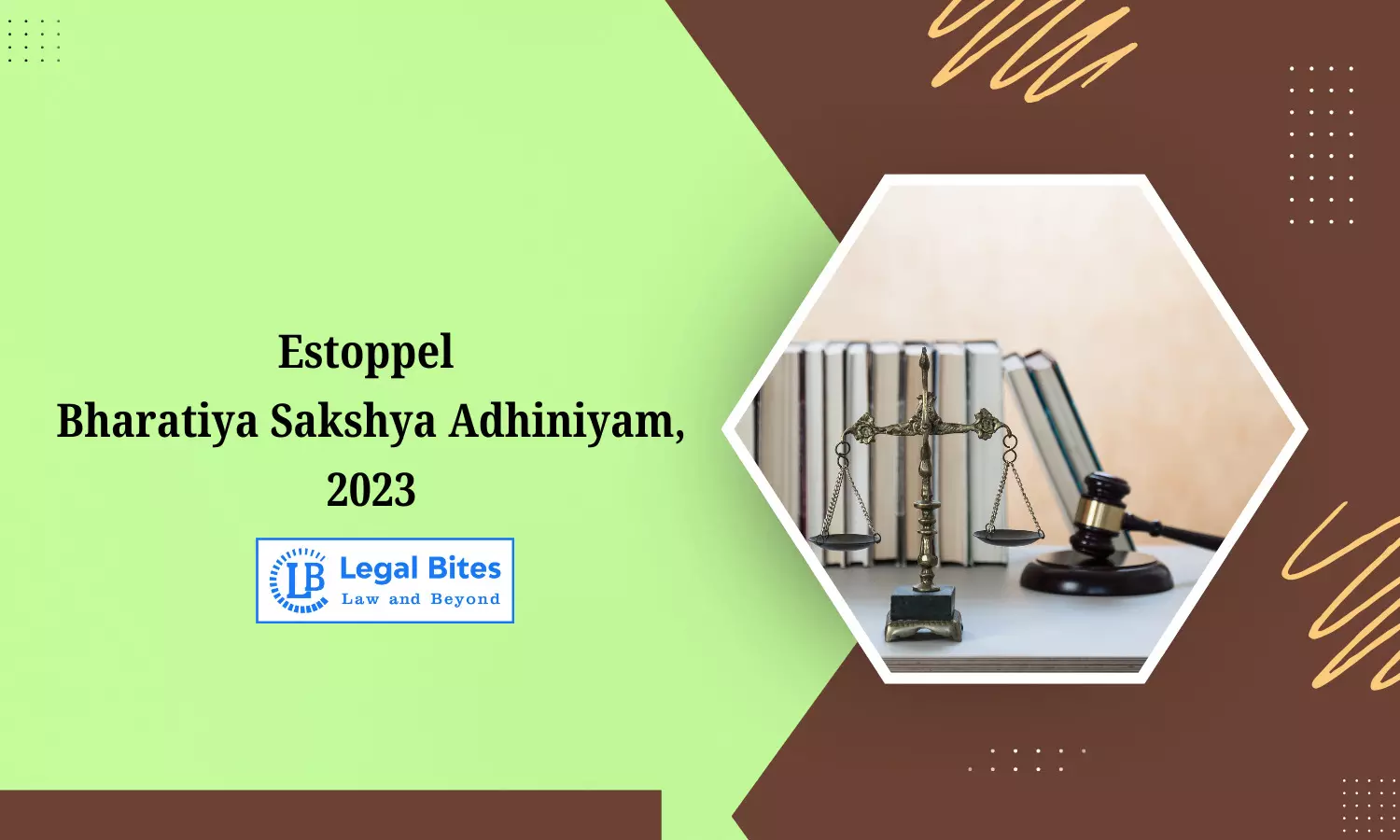Estoppel under the Bharatiya Sakshya Adhiniyam, 2023
This article explores the origin, meaning, and various forms of estoppel as codified under the Bharatiya Sakshya Adhiniyam, 2023.

The doctrine of estoppel is a vital principle in the Indian law of evidence that prevents a person from denying or asserting something contrary to what they previously represented, especially when another person has relied upon that representation to their detriment. This principle, rooted in equity and good conscience, ensures fairness in legal proceedings by disallowing inconsistent conduct. Under the Bharatiya Sakshya Adhiniyam, 2023 (hereinafter referred to as BSA), estoppel finds...
The doctrine of estoppel is a vital principle in the Indian law of evidence that prevents a person from denying or asserting something contrary to what they previously represented, especially when another person has relied upon that representation to their detriment. This principle, rooted in equity and good conscience, ensures fairness in legal proceedings by disallowing inconsistent conduct. Under the Bharatiya Sakshya Adhiniyam, 2023 (hereinafter referred to as BSA), estoppel finds explicit recognition, replacing the earlier provisions under the Indian Evidence Act, 1872 (IEA).
With the enactment of BSA, a new legal framework has emerged to regulate the rules of evidence in India. While much of the content of the IEA has been retained, the BSA has modernised and streamlined various evidentiary principles to align with contemporary needs.
Meaning and Origin of Estoppel
The term "estoppel" originates from the French word “estoupail” meaning a stop or bar. In law, estoppel serves as a bar preventing a person from contradicting something they previously affirmed, if it would be unjust to another who relied on that assertion.
In common law, estoppel evolved as an equitable remedy to prevent injustice due to a party's change in position based on another's representation. The principle gained statutory recognition in India through Sections 115 to 117 of the Indian Evidence Act, 1872, now replaced by corresponding provisions under the Bharatiya Sakshya Adhiniyam.
Pickard v. Sears (1837) (6 Ad & E 469) is a foundational case in the development of the doctrine of estoppel. In this case, the Court laid down that a person cannot later contradict a statement or representation they had previously made, especially when another has relied on it to their detriment.
Statutory Basis under Bharatiya Sakshya Adhiniyam, 2023
Under the BSA, Sections 121 to 123 codify the doctrine of estoppel. These sections closely resemble their counterparts in the repealed Indian Evidence Act (Sections 115–117) but are framed in simpler and updated language.
Section 121 – Estoppel
This is the central provision defining estoppel under BSA. It states:
“When one person has, by his declaration, act or omission, intentionally caused or permitted another person to believe a thing to be true and to act upon such belief, he shall not be allowed, in any proceeding between himself and that person or his representative, to deny the truth of that thing.”
This statutory provision enshrines the principle that a person who leads another to believe something, and that belief is acted upon, cannot later deny it in legal proceedings.
Essential Ingredients:
- Representation: A clear declaration, act, or omission.
- Reliance: Another person must have believed the representation to be true.
- Action based on belief: The person must have acted on such belief.
- Change in position: There must be a change in the position of the other party.
- Prohibition: The person making the representation is estopped from denying it.
Section 122 – Estoppel of Tenants and Licensees
"No tenant of immovable property, or person claiming through such tenant, shall, during the continuance of the tenancy or any time thereafter, be permitted to deny that the landlord of such tenant had, at the beginning of the tenancy, a title to such immovable property; and no person who came upon any immovable property by the licence of the person in possession thereof shall be permitted to deny that such person had a title to such possession at the time when such licence was given."
Likewise, a licensee cannot deny the authority of the licensor during the license period.
Rationale:
The relationship between the landlord and tenant or licensor and licensee is fiduciary in nature. Estoppel here ensures:
- Legal certainty,
- Avoidance of frivolous disputes,
- Protection of the landlord's or licensor's interest.
Section 123 – Estoppel of Acceptors of Bill of Exchange, Bailees, and Licensees
Acceptor of Bill of Exchange: Cannot deny that the drawer had authority to draw or endorse the bill once it is accepted.
Bailee: Cannot deny that the bailor had the authority to make the bailment when the bailment began.
Licensee: Cannot deny that the licensor had the authority to grant the license at the time it commenced.
Explanations:
Explanation 1 – Exception for Acceptor:
The acceptor may deny that the bill was actually drawn by the person it appears to be from (e.g., forgery).
Explanation 2 – Exception for Bailee:
If a bailee delivers the goods to someone other than the bailor, they may prove that the other person had a better right to the goods than the bailor.
Types of Estoppel
Estoppel is a principle rooted in equity and fairness, which prevents a person from asserting something contrary to what is implied by a previous statement, action, or legal position that another party has relied upon. Indian law recognises several types of estoppel, each operating in different contexts and with specific legal consequences.
1) Estoppel by Record, also known as estoppel by judgment, arises when a matter has been finally adjudicated by a competent court and the parties are barred from reopening or re-litigating the same issue in subsequent proceedings. This form of estoppel is intended to ensure finality in litigation and prevent abuse of the judicial process.
2) Estoppel by Deed occurs when a party makes a formal declaration of facts through a legally executed document, such as a deed. Once such declarations are made, neither the party nor their legal successors can later deny those facts in legal proceedings.
This principle enforces the sanctity of formal documents in legal transactions. However, it is important to note that estoppel by deed does not apply if the deed was obtained through fraud, coercion, or is otherwise illegal.
3) Estoppel in Pais, also referred to as estoppel by conduct or representation, is derived from the term “in pais,” meaning “outside the court.” It applies when one party, by words, actions, silence, or omissions, intentionally induces another party to believe a certain fact and to act upon it. This type of estoppel can arise within the scope of a contract or even outside of it.
For instance, if someone permits another to act to their detriment based on a false impression created by their conduct, they are estopped from later denying the truth of that impression.
4) Promissory Estoppel is a more modern and equitable form of estoppel. It applies when one party makes an unequivocal promise, knowing that the other party will act on it, and the other party does so to their detriment. Even in the absence of a formal contract, the promisor may be held bound by their promise.
This doctrine has often been applied in administrative and constitutional law contexts, especially when governments or public authorities issue assurances or policy promises that induce reliance from private individuals or corporations. Promissory estoppel aims to prevent injustice that may result from the arbitrary withdrawal of such promises.
Important Case Law
Tata Iron & Steel Co. Ltd. v. Union of India & Ors. (2000)
The Supreme Court dismissed TISCO's appeal challenging the withdrawal of benefits under the International Price Reimbursement Scheme (IPRS). TISCO had claimed reimbursement for exports using steel it manufactured itself, without paying the Joint Plant Committee (JPC) levies. The Court held that reimbursement presupposes actual expenditure, which TISCO had not incurred. The Court also rejected TISCO’s plea of estoppel by conduct, noting that the undertaking to refund excess payments ruled out any such claim. It emphasised that allowing such a benefit would amount to unjust enrichment.
Conclusion
Estoppel under the Bharatiya Sakshya Adhiniyam, 2023, continues to serve as a crucial doctrine in maintaining consistency, fairness, and predictability in legal relationships. While the core principles remain unchanged from the Indian Evidence Act, 1872, the BSA simplifies the doctrine’s language, offering better accessibility to litigants and lawyers.
Its real strength lies in preventing dishonest denial of earlier representations and ensuring that parties act in good faith. As Indian courts continue to balance statutory and equitable principles, estoppel will remain a powerful tool in the arsenal of substantive justice under the evolving legal system.
References
- Bharatiya Sakshya Adhiniyam, 2023
- Indian Evidence Act, 1872
- Estoppel and Types of Estoppel in Evidence Act, Available Here
- Tata Iron & Steel Co. Ltd. v. Union of India & Ors., AIR 2000 SC 3706
- Doctrine of Estoppel: Understanding Estoppel – Maxims, Legal Principles and Statutory Provisions, Available Here

Karan Patel
Karan Patel is an alumnus of the prestigious Faculty of Law, Delhi University, with a specialization in Civil Law and Procedural Law. As a dedicated legal scholar, his work focuses on exploring the nuances of civil justice systems and procedural frameworks through in-depth research and writing.
